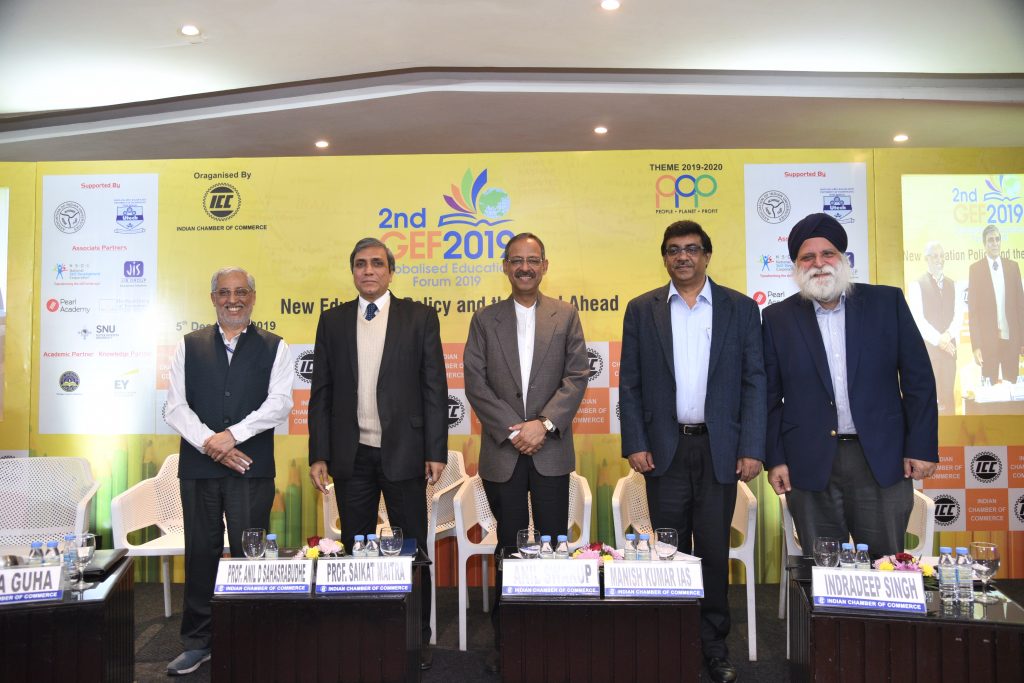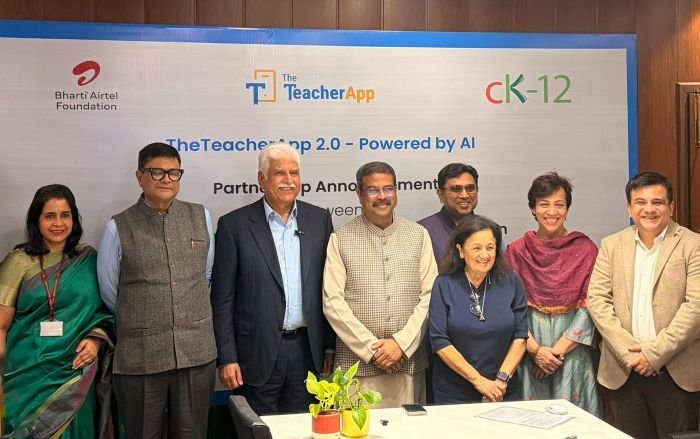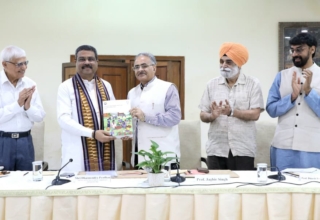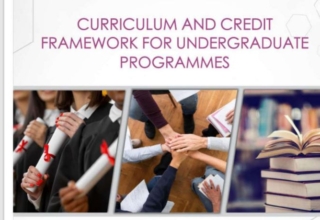

The making of the New National Policy on Education (NPE) has moved into its final phase with finalization of a 55-page draft and all indications are that the new NPE could be announced in this month (December) before the end of this year 2019. The ‘final’ draft has not been released though it is widely in private circulation on social media, may be subject to last minute minor changes before a cabinet approval. However, it is unclear if the final draft policy will be placed in the Parliament before the policy document is announced.
A high ranking officer in the ministry of MHRD, Dr Shakila T Shamsu, OSD (NEP), Department of Higher Education, said that as now the government position is that the policy is still at drafting stage. While delivering a keynote address at the Globalised Education Forum (GEF) of Indian Chamber of Commerce on ‘New Education Policy and the Road Ahead’ in New Delhi on Dec 5, Dr Shamsu, however, indicated that all affiliations to universities by colleges will cease by 2035 as the high education will consolidate and the three categories will become a reality by then.
She also said that extension of Right to Education either ways may come about, but will it be 3-6 years first or 14-18 years is still a matter of examination as such a decision has financial implications. “When we are talking about a $5 trillion economy, provision of 6perent of GDP of education may become a reality as moving from current 4.8 to 6 is a possibility,” she added, while talking about provisioning of 20% of public expenditure over 10 year period on education. “Some states spend more than this, some less, so are providing a benchmark.”
Dr Shamsu felt confident that the new draft NEP has done well to address key issues pertaining to both school and higher education. While saying that foundational learning has been put into mission mode and preschool education has been given the required attention, she said that a new approach to pedagogy has been conceptualized while restructuring curriculum into 5+3+3+4 keeping in view the scientific aspect of child growth and cognitive behavior.
She also talked about bringing down the boundaries between academic and co-curricular curriculum and provide children freedom and flexibility to pursue subjects of their interest. “School complexes of 30 schools are thought through for pooling resources such as music teachers and others to enable this,” she added.
Dr Shamsu while highlighting policy recipe for higher education did mention that medical education and legal education is unlikely to be brought into the ambit of restructured higher education regulatory and administrative frameworks.
It is pertinent to mention that a draft NEP consisting of 484-pages was released on May 31 for inviting public suggestions and comments with two extensions in dates till August 15 during which time more than two lakh of these comments were received, a suggestive of widespread interest and stake that draft NEP had evoked. According to sources 80% of these suggestions were more or less in line with the draft and the other 20% sought major changes. The new NPE making having started in 2015 is now about five year old has seen two drafting committees, first led by former cabinet secretary, TSR Subramanian, and the second and final one by former ISRO chief, Dr Krishnaswamy Kasturirangan.
While the new ‘final’ draft has retained the broad outline and architecture as laid down in the May 31st draft, the National Commission for Education or Rashtriya Shiksha Aayog (RSA) recommendation as the apex body for education nationally, which was to be headed by the Prime Minister as per earlier draft, will now be chaired by union Education (HRD) minister. The issue had come up at the 21st September meeting of the Central Advisory Board of Education (CABE), where several states had expressed reservation over the move and along with many experts were viewing the PM headed panel as a move towards centralization and a move which looked education getting from concurrent into union list.
While speaking at the valedictory function of the FICCI 15th Higher Education Summit in New Delhi on November 28, Dr Kasturirangan, said that the process of making the draft has been quite versatile and there was a peer review as well as consultations with 70-80 institutions for a reality check. He highlighted the emphasis on Undergrad liberal education, integration of vocation education at school and college level, no discrimination in funding of research between public and private besides stemming out dropouts and 100% enrolment by 2030 and foundational literacy and numeracy and inclusion of early education in school education. “The implementation of this policy is going to be a challenge but certainly it doable and the current government spending of 11-12% on education has to go to 20% and over a 10-year period, it must be possible,” he said.
At the same event, Dr G Vishwanathan, founder & chancellor of VIT, Chennai and former president EPSI raised the question of financing education and freeships. “We as a country don’t have national scholarships, which is an aspect not addressed by this policy. While about six lakh students who qualify in NEET want to be doctors, we have created a scarcity of seats, just 60,000, and then these students got to almost 20 countries outside from Uzbekistan to China, Bangladesh, etc. We are not realizing our potential in raising human capital just not country but for the world. Of all international students 77% are Asian and if we have an enabling environment we’ll not only retain our own students here but get a good number from aboard as well,” he said.

After losing its battle against dropping of no detention (section 16) under Right to Education Act, 2009 in parliament in 2018, RTE Forum and other activists, have stepped up efforts to reach out to parliamentarians to sensitize and educate them on the ‘shortcomings’ of the new education policy draft in the hope that when it comes for a discussion, MPs will be able to raise these issues. At an outreach session with MPs across political parties by the RTE Forum in New Delhi on November 27, the forum pointed to the vague wording in the draft like ‘examined’ for extension of RTE to preschool age of 3-6 years and secondary education years of 15-18. It also points out that the deadline of 2030 for 100% enrolment is too far given that it is more than decade when we achieved 98% of it. “Reprioritize education and provide financial commitment instead of incentivizing corporate world where you have already paid rupees two lakh crore,” said Prof. Muchkund Dubey, President of CSD and a former foreign secretary who headed Bihar’s common school commission committee.
Rajeev Gowda, a Congress Rajya Sabha MP, said that while there is an attempt to copy US model on research funding, it is not an inclusive process here as against US where ideas can come from anywhere and there is a culture of peer reviewing. “As long as we address equity issue, our own financing high education models must be looked into,” he added. Another MP Ravikumar from DMK said that Tamil Nadu has achieved a GER of 48% on its own strength and now with imposition of a third language and frequent public examination, there will be an increase in the dropout rates.
Not adhering to norms and hidden profits by private schools has almost given rise to a movement against rising fee and when policy speaks about light regulations, many people see it an attempt to more commercialization of education in the country. “It is strange that even after 73 years of independence; we’re still debating a national policy on education. As an MP, I have seen how a 20 student school gets a building and not a 200 children one. We don’t need schemes and norms that are sweeping in nature. There must be flexibility and district or block must be the level at which we should be planning things and executing them,” said Margani Bharat, chief whip of YSRCP in the Lok Sabha.
Former school education secretary, Anil Swarup while getting into government and private schooling debate says, there is a space for both in a vast country like ours where money for education is a challenge. “Some wonderful work is being done both in government schools as well as private schools. Not every private school is bad. You should help good of both come together and allow the magic to flourish. Government more than a regulator must act as a facilitator and encourage goodness of both sides to fulfill aspirations of a large country like ours,” he said while speaking at ICC event mentioned above.
At the same event Manish Kumar IAS, MD & CEO, NSDC spoke about linkages of skilling with education. He said that NSDC is in process of doing analytics to see how skills and education can come together in schools as they were looking at work in 9000 schools over 9lakh students and from the recent tie up in Haryana with 100 kunskapsskolan schools. Kumar made important observations on the challenge beyond education and skilling. “We still have the system of education 2.0 where there was a standardized system for everything. We need to make it modular, creative and job-oriented,” he said. He also said that focus on skilling by countries like China and South Korea have pushed per capita income by 13 times and there is a clear cut relationship between prosperity and skilling. “There can be a different view of the education policy and depends on how do you look at it. In our country bottom 10% population has one requirement, another 20% have another and the 30% middleclass has their view. We have tend to become fixed with this 30% some how,” he implied. Talking about challenges in skilling, Kumar said that strangely the women employment has dropped in recent years with rising income. “There is a pressing need to bring women into workforce as they constitute 50% of population and we are looking at digital skills which will enable large number of women to work from home.” He also said that today’s youth have been increasingly delaying getting into jobs and staying for longer in education system.
Prof. N.V. Varghese, VC, NIEPA says universities are being unnecessarily criticized for quality of graduates. According to him, universities are there for core function of knowledge creation and transaction and there is a an attempt to pass training costs by industry to universities. “Universities have to produce trainable good graduates and not finished product or as they say job ready people,” he added.
Prof. M. K. Surappa, Vice Chancellor, Anna University, Chennai while talking about research quality in higher education, illustrated how ill information was spread on country’s research ranking. He said that by volume Indian research papers rank at 12 in last 40 years and by citation ranking 14th. He blamed shortage of fulltime faculty and role models for poor research outcomes in the country. “In pleasing friends, you’re harming institutions and country. We need to take a serious look into governance of higher education institutions. We need people with higher academic credentials and integrity to inspire our world aspiration. “
Report by Autar Nehru








